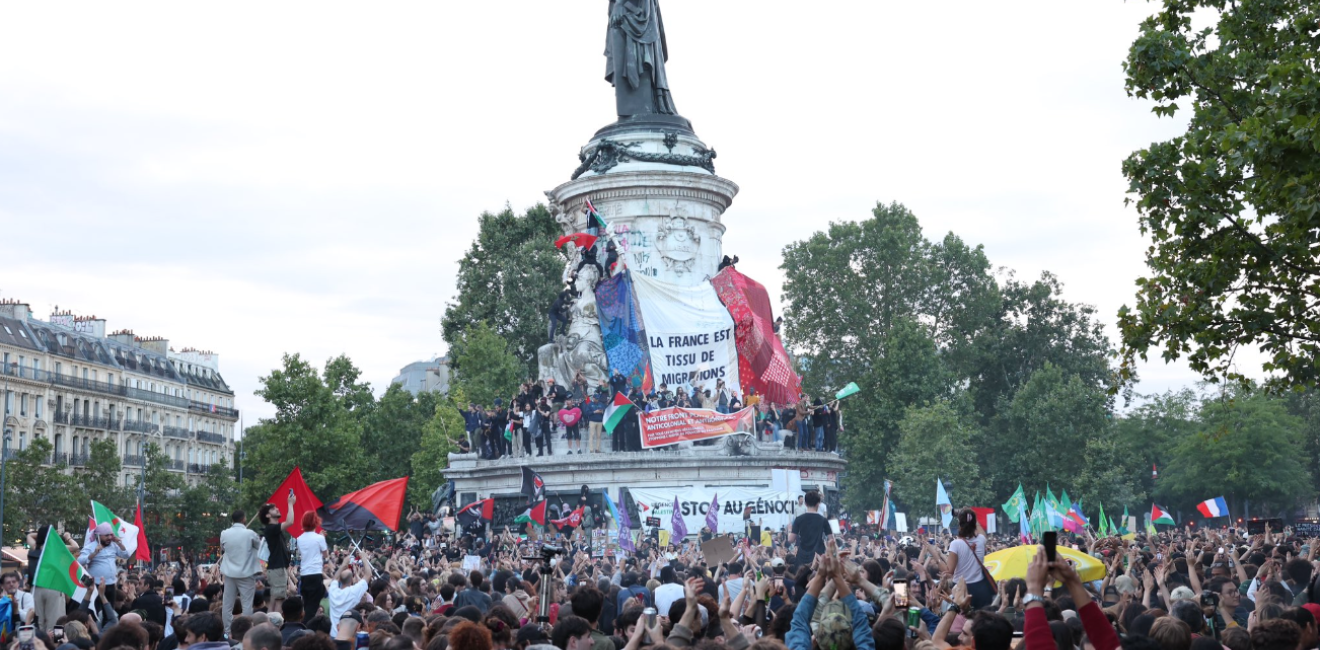All eyes were on France this weekend as the country voted on the new composition of the parliament. Following the defeat of his party in the European Parliament elections in June, French President Emmanuel Macron called snap elections in a bid to shore up his support and ensure he could continue his second term from a position of power. The first round of these snap elections a week ago resulted in disaster and panic for Macron’s centrist party, which slumped to third place. The National Rally, France’s far-right party that has openly questioned the country’s NATO and EU memberships, was the clear winner from the first round as the top party, with widespread concerns they would perform as well in round two. In the last week, Macron’s centrists and the left alliance, the New Popular Front (NPF), scrambled with one goal–prevent the National Rally from entering government. In the end, the two parties kept the National Rally from gaining power, but now Macron is likely facing a hung parliament and political gridlock. In the coming weeks, Macron and the left-wing alliance will either try to form a minority government, enter into an uneasy coalition with a cohabitation government (with the prime minister role held by the left), or a technocratic government of experts may emerge as the only viable path forward. The rebalance of power after the elections will limit Macron's ambitions and leadership, impacting attempts to create a more geopolitical European Union and limiting French support for Ukraine.
What led Macron to call snap elections?
What led Macron to call for parliamentary elections in the first place? He was only recently voted into his second term in 2022 and the next elections are not scheduled until 2027. The European Parliament elections in June and his party’s poor performance prompted the decision, amidst the groundswell of the far-right National Rally party, which came in first with 31.4% of the vote. The National Rally received the highest vote share in the party’s history and twice as much as Macron’s party in the European Parliament elections. Macron’s unexpected decision to call for snap legislative elections in the aftermath of this historic defeat took everyone by surprise. In the 2022 election cycle, Macron’s coalition failed to win an outright parliamentary majority, leading to difficulty passing certain bills. To pass controversial bills like his pension reform, Macron has increasingly had to bypass Parliament and resort to presidential decree, which has provoked outrage in opposition parties and in public opinion.
What did he hope to achieve with these snap parliamentary elections? One theory holds that Macron was gambling that he could defeat the “extremist” parties by exposing them to the government. As Marine Le Pen, leader of the National Rally, is increasingly seen as a viable candidate for president in 2027 with Macron unable to stand for a third term, this election forced her party into the limelight ahead of this critical presidential election. Out of office, both the hard left and the far-right have been able to rail against Macron’s policies and make promises of their own. Macron’s plan could have been to bet that once in office, they will run into constraints and may find themselves unable to deliver on their promises, or risk being viewed as incompetent. The rationale was that relinquishing some power now may give Macron’s party a better chance of retaining power in 2027 for someone else from Macron’s centrist party to run for office.
Another theory suggests France might soon have been forced to the polls anyway. Every time Macron passes a law by presidential decree, under article 49.3 of the French Constitution the Parliament can hold a vote of confidence in his government. Perhaps Macron considered that the government may not have survived another vote of confidence, and he judged better to call for snap elections himself rather than being pushed into it. Macron was under no obligation to dissolve Parliament, even if the European vote reduced his credibility for the three remaining years of his presidential term. He, however, believed that a dissolution had become inevitable and that a snap election was the only way to respect the will of the people. Macron presented this election to voters as a stark choice between him or the political extremes.
France votes and rejects the far-right
In an unexpected turn of events, the left-wing alliance shocked onlookers and took the top place in the parliamentary elections. No single party had an outright majority, but the centrists and leftists succeeded in bumping the far-right from first place to third place. The National Rally party still gained more than 50 seats since France last held parliamentary elections in 2022–a worrying trend showing the party may not have won this battle, but the war is far from over.
France now finds itself in a state of political paralysis and gridlock. Macron’s Prime Minister, Gabriel Attal, offered his resignation but Macron asked him to help oversee a caretaker government through the Olympics. In the ensuing weeks, a new prime minister from the left-wing New Popular Front will be chosen, which leads to what is called a cohabitation in France. A cohabitation between a president from one party and a prime minister from another is uncommon in modern French political history. It happened most recently when Jacques Chirac, a center-right Gaullist, governed with a Socialist prime minister, Lionel Jospin, between 1997 and 2002. Although the ideological discrepancy between a president and a prime minister would have been more severe if the prime minister was from the National Rally, the far-left may prove equally difficult to cooperate with for Macron. The New Popular Front, consisting of multiple left-leaning parties encompassing a wide array of disparate views, did not receive enough votes for a majority government. In the ensuing weeks, a minority government may attempt to govern (with the possibility of a vote of no confidence in the National Assembly). The NPF has ruled out entering into a coalition government with the centrists. They will seek to implement their agenda, including radical reforms to the French economy in direct opposition to Macron’s recent changes to the retirement age and pension reform. The left-wing alliance were united under a common banner to prevent the National Rally from winning, but now their internal divisions are already on display as they decide who to put forward as their prime minister.
The choice of prime minister will directly impact Macron’s leadership at home and abroad. There is a division of labor between the president and the prime minister in France. The former has the monopoly over foreign policy while the latter oversees domestic policy. The prime minister has core national defense responsibilities, and control over the budget and the administration. While the president has broad abilities to govern by presidential decree, the approval of Parliament, especially of the National Assembly, is required on most major domestic policy changes and key pieces of legislation, including spending bills. Moreover, the National Assembly members can topple a French cabinet with a no-confidence vote, and it gets the final word if the two houses of Parliament disagree on a bill. The composition of the National Assembly therefore determines how France is governed. Although Macron would retain some powers over foreign policy and would remain commander-in-chief, the next prime minister would likely constrain Macron. Fundamentally, the new prime minister would likely come from the left-wing alliance with different priorities and policies running in parallel or at odds with Macron’s. This state of paralysis will impact Macron’s leadership on the EU level and limit the numerous initiatives he has undertaken to increase European strategic autonomy.
What does this mean for Macron’s vision for Europe?
Despite the National Rally not coming out on top, Macron will still confront a Parliament questioning his policies. On the EU agenda, Macron has been energetically pro-European, and has been seen as a major driver of strengthening European defense cooperation, including the European pillar of NATO. Macron’s view is that the EU is being severely tested by the Russian war in Ukraine, and that the way forward is to unite and pool its military and industrial resources. This view about the dire need to defend and support Ukraine is overall shared by the New Popular Front, despite some nuances and disagreements between the parties forming the coalition. However, the EU agenda of the New Popular Front differs from the President’s on a number of issues, such as trade, the Common Agriculture Policy, the fight against climate change, and taxation. Indeed, the left-wing alliance is more radical and ambitious, but the reality is that it would be even more complex to reach political consensus on those files with the new fragmented National Assembly. When it comes to the National Rally’s agenda, they have stated nations should reassert themselves against European federalism and against globalization. The party wants to strictly control borders, resist what they denounce as “punitive” ecological measures emanating from Brussels that it says drive up prices, and prevent what it sees as the dilution of nationhood through immigration. The National Rally is overall skeptical of France’s engagement with both the EU and NATO. However, without an actively engaged France, both would be significantly weakened, especially the EU. Macron’s gamble–likely leading to institutional blockade–therefore risked plunging France into political, social, and economic turmoil.
France is not the only country reeling from the recent European Parliament elections–the German Chancellor Scholz’s governing three-party coalition suffered a crushing blow as well. The fact that France could be facing a prolonged governmental crisis is bad news for the Franco-German engine of the EU. As EU institutions are transitioning to a new Commission with the new five year-mandate, the EU will need strong support from member states, especially France, to tackle pressing global challenges. The newly revitalized Weimar Triangle format– that includes France, Germany, and Poland–will be under increased strain. The triumvirate will need to rise above the fallout of the European Parliament elections to support Ukraine, EU enlargement, institutional reform to make an enlarged union function more effectively, strengthen the EU defense industry, and the next seven-year budget. A weakened or constrained government in France and Germany is not a good sign for EU progress on any of those issues.
Although the elections could have gone much worse for President Macron, this by no means was a victory for his centrist party nor for his vision of a stronger Europe. Macron’s centrists and the left-wing New Popular Front succeeded in keeping the National Rally from fully enfeebling Macron’s next three years in the presidency. Once the dust settles and a new prime minister is appointed, Macron will have to determine how much of his vision he can act on and he will likely need to limit some of his ambition. Ultimately, the National Rally has been defeated but is not gone forever, there is a very real chance that their wave of support will continue to gain momentum on the way to the next major elections in 2027.
Authors



Global Europe Program
The Global Europe Program is focused on Europe’s capabilities, and how it engages on critical global issues. We investigate European approaches to critical global issues. We examine Europe’s relations with Russia and Eurasia, China and the Indo-Pacific, the Middle East and Africa. Our initiatives include “Ukraine in Europe”—an examination of what it will take to make Ukraine’s European future a reality. But we also examine the role of NATO, the European Union and the OSCE, Europe’s energy security, transatlantic trade disputes, and challenges to democracy. The Global Europe Program’s staff, scholars-in-residence, and Global Fellows participate in seminars, policy study groups, and international conferences to provide analytical recommendations to policy makers and the media. Read more

Explore More
Browse Insights & Analysis
Greenland’s New Governing Coalition Signals Consensus

The Future of France's Far-Right Party

Ukrainian Issue in Polish Elections

